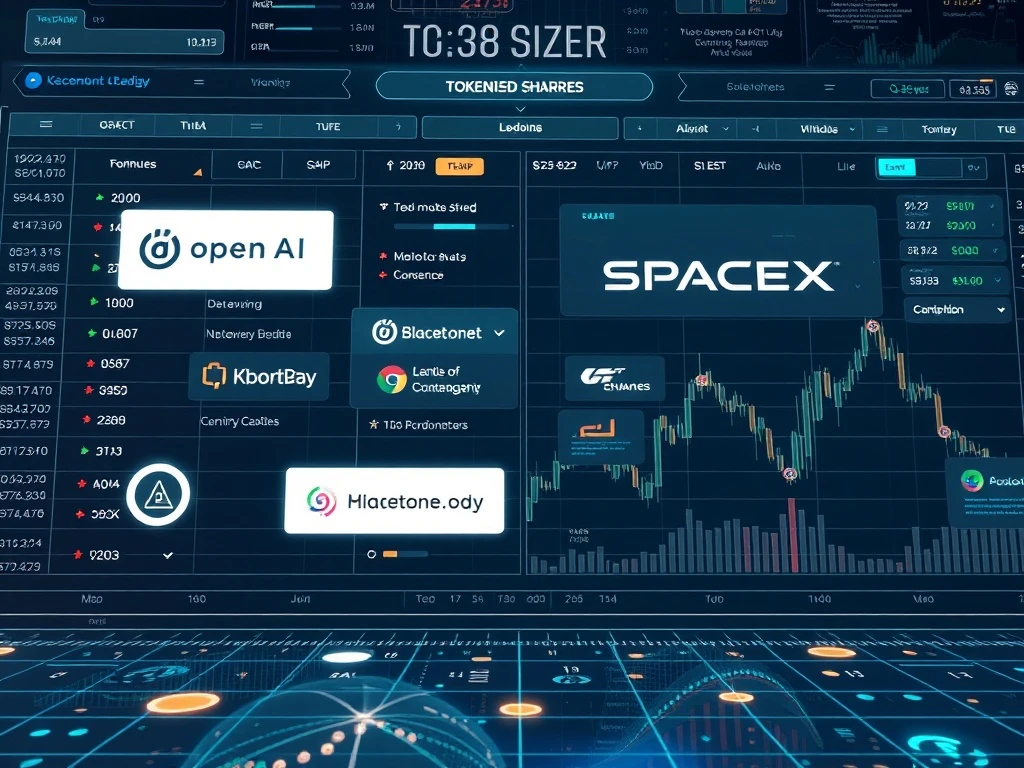A new era in investment is emerging. Soon, investors may gain access to highly sought-after private company equity. This includes shares from innovators like OpenAI and SpaceX. These opportunities are becoming available through the power of tokenization. Many investors are now considering **trading private shares** of these leading firms. This development could reshape how individuals participate in high-growth ventures. It certainly broadens the landscape for potential returns. However, understanding the mechanics and risks involved is crucial.
The Dawn of Tokenized Private Shares
The financial world is undergoing a significant transformation. Historically, investing in private companies like OpenAI or SpaceX was exclusive. Only large institutions or accredited investors could participate. These opportunities were often limited to early funding rounds. Now, blockchain technology is changing this dynamic. It enables the creation of ‘tokenized’ shares. This means fractional ownership of a company’s equity. These digital tokens represent a stake in the private company. They can be bought and sold on specialized platforms. Consequently, a wider range of investors can access these assets. This development significantly democratizes investment access. Therefore, it opens doors to previously inaccessible markets.
Why are Investors Eyeing Private Shares?
Private companies, especially those in cutting-edge sectors, often exhibit explosive growth. They can innovate rapidly without public market pressures. Many investors seek to capitalize on this early-stage potential. Furthermore, these companies frequently generate substantial returns before their Initial Public Offering (IPO). Consider the success stories of companies like Uber or Airbnb. Their private valuations soared before they went public. This track record makes **trading private shares** incredibly appealing. Investors hope to capture a piece of this pre-IPO appreciation. This strategy aims for higher returns than typically found in mature public markets.
How Tokenization Facilitates Trading Private Shares
Tokenization is the process of converting real-world assets into digital tokens on a blockchain. For private company shares, this means creating a digital representation of ownership. Each token represents a specific fraction of a share. This process offers several advantages. First, it allows for fractional ownership. Investors can buy small portions of expensive shares. Second, it enhances liquidity. These tokens can be traded on secondary markets. This provides an exit strategy for investors. Third, blockchain technology ensures transparency and security. Every transaction is recorded on an immutable ledger. Consequently, the process becomes more efficient and less costly. This innovative approach makes **trading private shares** more accessible and manageable for many.
Understanding the Pre-IPO Market Dynamics
The pre-IPO market operates differently from public exchanges. Companies in this stage are still developing. Their valuations are often based on growth potential and private funding rounds. Access to financial information can be more limited. Furthermore, liquidity is generally lower than in public markets. However, tokenization aims to address some of these limitations. It introduces a structured way to trade these assets. Platforms facilitating these trades connect buyers and sellers. They manage the legal and compliance aspects. Therefore, understanding these unique dynamics is essential. Investors must recognize the distinct characteristics of private market investing.
The Allure of OpenAI and SpaceX Private Shares
OpenAI and SpaceX are at the forefront of technological innovation. OpenAI leads in artificial intelligence development. Its products, like ChatGPT, have captured global attention. SpaceX is revolutionizing space exploration and satellite internet. Both companies command significant public interest and high valuations. Their private shares are highly coveted. Institutional investors have long sought access to these firms. The prospect of **trading private shares** from such iconic companies is therefore very exciting. It represents a chance to invest in future-defining technologies. This potential for significant growth attracts many forward-thinking investors.
Benefits of Trading Private Shares Through Tokenization
Tokenization brings several key benefits to the private share market. Firstly, it lowers the entry barrier. Retail investors can participate with smaller capital amounts. Secondly, it provides increased liquidity. Investors can sell their tokens more easily than traditional private equity. Thirdly, it offers global accessibility. Anyone with an internet connection can potentially participate. This contrasts sharply with geographical restrictions of traditional markets. Finally, it streamlines the investment process. Smart contracts can automate many aspects of share transfer. Therefore, tokenization truly democratizes access to high-growth private companies.
Navigating the Risks of Trading Private Shares
While appealing, **trading private shares** carries inherent risks. Investors must approach these opportunities with caution. Understanding these risks is paramount for informed decision-making. These markets are not without their challenges. Diligence is always required before any investment.
- Volatility: Private company valuations can fluctuate significantly. They are often sensitive to market sentiment and company-specific news. Unlike public stocks, price discovery can be less transparent.
- Liquidity Concerns: While tokenization improves liquidity, it does not guarantee immediate sales. The market for these tokens is still nascent. Finding a buyer quickly might be challenging in certain conditions.
- Regulatory Landscape: The regulatory environment for tokenized securities is evolving. Rules vary by jurisdiction. Changes in regulations could impact the legality or viability of these platforms.
- Due Diligence: Access to comprehensive financial data for private companies can be limited. Investors must conduct thorough research. Understand the company’s business model, financials, and management team. Relying solely on hype can be dangerous.
Key Considerations Before You Invest
Before committing capital, consider your financial situation. Assess your risk tolerance carefully. Private market investments are generally illiquid and high-risk. Only invest funds you can afford to lose. Furthermore, diversify your portfolio. Do not put all your capital into a single private company. Research the specific platform facilitating the trade. Ensure it is reputable and compliant. Understand the fees involved. Always consult with a financial advisor if unsure. Prudent decision-making is essential in this new investment frontier.
Tokenized Private Shares vs. Traditional Public Markets
The distinction between tokenized private shares and traditional public market stocks is significant. Public markets offer high liquidity. They have established regulatory frameworks. Information is widely available. Companies must meet strict reporting requirements. Conversely, **trading private shares** through tokenization offers early access to growth. It allows for participation in companies before their IPO. This can lead to higher potential returns. However, it also involves greater risk and less transparency. Public markets are mature and well-understood. Private tokenized markets are innovative and rapidly developing. Each presents a unique risk-reward profile. Investors must choose based on their objectives and comfort with risk.
The Future of Private Market Investing
Tokenization is poised to reshape private market investing. It democratizes access to high-growth companies. It enhances liquidity and efficiency. This trend could lead to a more inclusive financial system. We may see more private companies opt for tokenized equity. This could bypass traditional IPO routes. The integration of blockchain with traditional finance is accelerating. Ultimately, this innovation offers exciting possibilities. It creates new avenues for capital formation and wealth creation. The landscape of investment is undoubtedly expanding.
The ability to begin **trading private shares** of companies like OpenAI and SpaceX represents a significant shift. It offers an enticing opportunity for investors seeking high growth. Tokenization has opened doors previously closed to many. However, this exciting development also comes with considerable risks. Volatility, liquidity challenges, and regulatory uncertainties demand careful consideration. Investors must conduct thorough due diligence. They should understand the underlying assets and platforms. Ultimately, a balanced approach is best. Embrace the potential rewards while managing the inherent risks. This new frontier requires both enthusiasm and prudence.
Frequently Asked Questions (FAQs)
What are tokenized private shares?
Tokenized private shares are digital representations of equity in private companies. They are recorded on a blockchain. These tokens allow for fractional ownership and enable secondary market trading. They make private investments more accessible to a wider range of investors.
How does tokenization make trading private shares possible?
Blockchain technology enables tokenization. It breaks down large assets into smaller, tradable units. This allows for fractional ownership. It also creates a secure, transparent, and efficient way to transfer ownership. This process bypasses many traditional barriers to private market access.
What are the main benefits of investing in private shares through tokenization?
Key benefits include lower entry barriers for investors, increased liquidity compared to traditional private equity, and global accessibility. It offers a chance to invest in high-growth companies before their public offering. This can lead to significant returns.
What risks are associated with trading private shares of companies like OpenAI and SpaceX?
Risks include high volatility, potential liquidity issues, and an evolving regulatory landscape. Access to detailed financial information can be limited. Investors must conduct thorough due diligence. Private markets carry higher inherent risks than public markets.
Are tokenized private shares regulated?
The regulatory environment for tokenized securities is still developing. Regulations vary significantly across different jurisdictions. Some platforms operate under specific exemptions. Investors should research the regulatory compliance of any platform before investing.
How do I research private companies like OpenAI or SpaceX before investing?
Research involves understanding the company’s business model, market position, and management team. Look for news, industry reports, and reputable analyses. Be aware that private companies have fewer disclosure requirements than public ones. Use all available information sources wisely.








